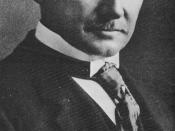During the course of this essay, you will see a description of the works of Frederick Winslow Taylor and Abraham Maslow. You will see many criticisms about both Taylor and Maslow. I shall demonstrate how, when faced with the criticisms, each one would argue their ideas, and finally summarising my findings. The numbers appearing in [these brackets] are references from my research and are referenced fully, on page 7. Frederick Taylor (1856 - 1915) developed the principles of scientific management in America in the early decades of the twentieth century. Frank & Lillian Gilbreth, Henry Gannt significantly contributed to the theories, but Taylor was the main individual to develop this theory.
Philadelphia was the industrial heart of 1800s America. Taylor was born in 1856 of well-to-do parents who helped him achieve an excellent general education. He travelled to Europe on many occasions and attended schools in Germany and France.
Taylor had qualified to read Law at Harvard, but having encountered many problems with his eyes, he pursued a new career. He began his working career in 1875 as an apprentice turner/machinist, in a small firm of engineers. He later joined the Midvale steel company, which was the beginning of his ideas and lead him to some of his theories. His education granted him a position as a senior-clerk; he disliked the office job and returned to the shop floor. By 1887, he became the shop superintendent of Midvale Steel Works. Here he investigated the output potential of every worker. He received many threats and became very unpopular with workers. One reason for this as stated by [1] L Urwick & E.F.L. Brech, Vol. I, 1963, pg29, Taylor was challenging what his fellow workers regarded as the inalienable privilege of setting their own pace. The logic for this idea is...


